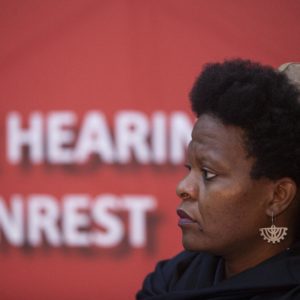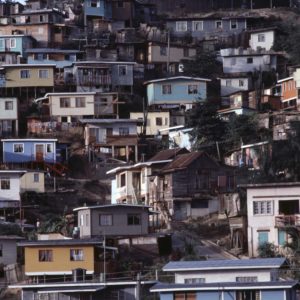Emancipatory hopes run out of road
The outcome of the recent elections and the searing testimony at the Human Rights Commission inquiry into the July riots illuminate the collapse of an emancipatory vision.
Author:
19 November 2021

Although there may be some new developments before Tuesday 23 November, when coalition negotiations need to be finalised, it has been clear for some time that the primary beneficiaries of the steady decline of the ANC are parties to its right, and parties grounded in narrow forms of ethnic and religious identification.
The ANC’s great historical achievement was to bring a sense of shared belonging to a nation in a territory marked out by arbitrary colonial borders, containing a great ethnic and linguistic diversity of people and long subject to forms of colonial rule specifically designed to define and then fix people into separate groups.
Although the ANC has always contained currents of crude chauvinism of various kinds, it was for many years dominated in principle – often in practice, too – by an openness to all who shared its political vision. After apartheid it was the DA and its predecessors that, in practice rather than stated principle, took on the form of a white-dominated party rooted in the support of racial minorities.
Related article:
ActionSA has been the most significant beneficiary of the decline in electoral and funding support for the DA. While it holds to a crude xenophobia, it is a party of a general right-wing nationalism rather than any kind of ethnic or racial chauvinism. But the resurgence of the IFP, the continued growth of the Freedom Front Plus, the rapid growth of the Patriotic Alliance, and the failure of the ANC to sustain the support of Black minorities in Durban and Cape Town point in another direction – towards the splintering of confidence in the idea of a South African nation.
A sober analysis of global experiences should not make this a surprising development. Belgium, a long-established democracy in a wealthy, peaceful and politically stable part of the world, has not been able to hold to the idea of a single nation as significant forces among its two largest ethnicities, Fleming and Walloon, push against the idea.
Spain, which began its process of democratisation after the death in 1975 of Francisco Franco, the right-wing dictator who had ruled the country since the end of the civil war in 1939, has not been able to develop a stable sense of shared belonging in a single nation.
The situation has been much worse in a number of other still older democracies, including India, where a fascist project has actively sought to expel Muslims and other minorities from a place in the nation.
Violent democracy
The idea that democracy has an inherent tendency towards peace and unity, an idea that was elevated into myth during South Africa’s transition to electoral democracy, is fantasy. Jamaican sociologist Orlando Patterson has shown that this myth is “inconsistent with the realities of democratic history and practice”, and that on the contrary, violence and centrifugal forces are typically present in transitional democracies. Competition for state power, and the opportunities for enrichment that it brings, can actively incentivise forms of clientelism that, sometimes intersecting with criminal organisations, take violent forms. It can also incentivise the deliberate cultivation of ethnic and racial forms of division, to build ready-to-hand political constituencies. Elections frequently reward divisive forms of populism, sometimes articulated to organised violence.
Until recently, the political violence nurtured within South African democracy has largely taken five forms, not all of which are directly related to electoral contestation: the assassination of state officials standing in the way of corruption, the police murder of people involved in autonomously organised grassroots dissent, inter and intra party assassinations, the assassination of grassroots activists and periodic outbreaks of xenophobic violence. In 2009, the year that Jacob Zuma became president, there was also a mercifully brief period in which Mpondo people were driven out of a small number of shack settlements in Durban in attacks explicitly presented in ethnic and Zuma-aligned terms.
Related article:
Organised criminal networks have also significantly penetrated the ruling party and the state, including the police, and generally operate with impunity. The escalating violence pushing South Africa towards the sort of endemic horrors long associated with central America do not exclude the rich, as the recent kidnapping of the Moti brothers has shown.
The July riots were many things, including a window into a possible future. The interconnected forces at play included organised violence and destruction from the kleptocratic faction of the ANC, a complicit state, a food riot on a staggering scale and racist vigilante violence.
We still do not know how most of the 359 people who died during this time lost their lives. But the harrowing testimony this week before the South African Human Rights Commission inquiry has brought the eruption of racist violence into sharp focus.
A strong streak of denialism
Ntombikayise Lutuka, a long-time resident of Phoenix, where 33 African people were murdered during the riots, recounted the horrific scenes she witnessed. “Our neighbours hacked and tortured Black [African] people right in front of us.” She concluded that her neighbours “no longer recognise me as a person”.
Testifying about the petrol bombing of the Khan Road shack settlement in Pietermaritzburg, and the cold-blooded shooting of a woman there, community activist Roshan Jainath wept as he described the inhumanity shown to impoverished people, who he said are always “criminalised”.
It is true that there were active attempts to mobilise anti-Indian sentiment from within the pro-Zuma faction of the ANC, that the police stood down from formal responses to the riots, that in Phoenix residents were frightened by fake news claiming to show attacks on people’s homes, and that a toxic intersection of local gangsters, security companies, and police officers and police reservists acting informally played a significant role in the racist violence. It is also true that many residents of Phoenix would be pleased if the corrupt police officers and gangsters were removed from the area, and that there are many residents who were appalled by what happened. It is also true that the history of progressive organising in the area is not entirely extinguished. But none of this, in any way, legitimises or relativises the unspeakable horrors of the indiscriminate attacks on African people.
Related article:
It is striking that there was no racially organised counter-violence. This significant fact should have generated profound reflection and, in some quarters, a degree of humility. But a noticeable element of the testimony to the commission has been a strong streak of denialism about the nature and extent of racist violence perpetuated by Indian people in the name of defending a racially defined Indian community. This has also been widely evident outside the commission. There has been a widespread and perhaps even systemic failure among Indian intellectuals to take adequate, let alone full, measure of the moment.
This denialism cannot be tolerated. Reality must be faced. In the specific context of how the riots were met with such monstrous racial violence, there is an obvious and urgent necessity for unflinchingly honest collective reflection, reparation and commitment to a new mode of politics predicated on solidarity. But a reorientation to the future requires credible and principled organisation and leadership, both of which are strikingly absent, as well as some sort of emancipatory vision.
New way forward
Drawing back from the racist violence that festered in the chaos of the riots and looking at South Africa in a wider frame, it is clear that widespread electoral abstentionism and the turn to the Right – and to narrow forms of ethnic and racial political identification – is also a consequence, at least in significant part, of the collapse of emancipatory vision.
When people do not see any prospects for a better society, they hunker down, give in to their prejudices, try to keep what they have and take what they can. There is no sense of a collective project or even a future in the sense of the attainment of progress rather than the passing of time.
Related article:
Reconstituting an emancipatory vision, and the organisational forms and practices to sustain it, is the great challenge of the moment. The old pieties must be put aside. The desire and demand that everyone be recognised as a person, an ethic with deep roots in African thought, need to be translated into effective political force and action.




